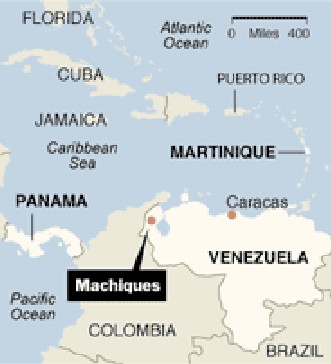
According to a news report by ecological group Sociedad Homo et Natura, a virtual state of emergency is operating in the Perija Sierra (Zulia) where Yukpa indians and local landowners are fighting over lands.
The Yukpa ethnic group is demanding legal title to its ancestral lands. They have "squatted" on farms in the area of Machiques (see map) to force the issue.
The Yukpa ethnic group is demanding legal title to its ancestral lands. They have "squatted" on farms in the area of Machiques (see map) to force the issue.
Venezuela Analysis reports the Yukpa were attacked last week by hundreds of armed "aggressors." According to the Yukpa, the attacking goons were hired by elite landowners to evict the indigenous population from the vast, largely idle pastures in the region known as the Sierra de Perijá near Venezuela’s northwestern border with Colombia.
The attacks were the latest and largest in a string of attempts to intimidate and terrorize a Yukpa community since they intensified their land recuperation efforts efforts over the past year by occupying 14 privately owned estates known as Haciendas. The Yukpa community has repeatedly suffered violent evictions, physical assaults and death threats by armed groups allegedly hired by the owners of the estates Tizina and Kusare. Despite repeated complaints and requests for protection made to the authorities, little appears to have been done to stop these outrages.
There have been reports of mediation and agreements, but events seem to contradict them.
Now, the National Ranchers Federation (Fedenaga) says it will take action against the invasion of nine farms in the Perija Sierra by the Yukpa and Motilon Indians. Six hundred producers have announced protest marches with other civil sector groups, claiming that the invasions are blocking 9,000 liters of milk a day destined for the Socialist milk industry.
According to the Venezuelan constitution, ratified by popular vote in 1999, and an Indigenous Peoples Law passed in 2005, the government has the obligation to grant indigenous communities legal title to their ancestral lands.
But the government has not often done this. Thus, Yukpa leaders say they have no choice but to trespass on the lands that were stolen from their grandparents over the course of the 20th Century.
Anonymous National Guard officials told independent journalists Monday that their troops are expecting to receive orders to clear the indigenous communities from the haciendas.
President Chavez has, as we say in the USA, flip flopped time and again on the issue.
One indigenous leader Cacique Romero who has helped organize the land occupations said this week, "The landowners have taken control of lands which by law pertain to us. While the landowners continue deforesting the region to make pastures for their cattle, we are rescuing crops, cacao, corn, sugar cane, avocado and coffee.
Regional and local authorities from both opposition and pro-government camps who support the expansion of coal mining in the delicate watershed region have consistently opposed the empowerment of Yukpa, Barí, and Wayúu indigenous communities in the area often resulting in protests and conflicts.
The following is from El Universal (Venezuela).
Ranchers denounce squat
The Venezuelan National Ranchers' Association (Fedenaga) reported that agricultural and livestock organizations in western Zulia state planned to protest for a state of uneasiness in several farms in the area of Machiques de Perijá as a result of squats by indigenous people.
According to a communiqué issued by Fedenaga, 600 local farmers and ranchers held a plenary session where they agreed to stage protests together with the civil society against the squat of nine ranches resulting in destruction of fields, pastures, machinery and even the cattle.
They added that some workers in the farms had been injured by the squatters with sharp weapons and firearms.
No comments:
Post a Comment